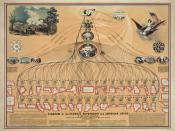The administration of government is a prime target for forces agitating for change in the American polity. The study of administration and bureaucracy is, in itself, of major importance to understand American government and policy. The distrust of many Americans of the federal government, demonstrates the need for organization through bureaucracies and public administration. They are closer to the people, and allow them to see their opinion, voice, and need placed into action. The reason for their mistrust is based on conceptual distance, and a sense of being removed from a federal government, which underlines the importance of bureaucracies as the start of the link between the two.
Political decisions in the early 1900ÃÂs influenced and radically changed the course of administration for future generations (Gianos 48-49). The question was; who would have the power to remove bureaucrats? What powers should agencies be delegated, and did they have the Constitutional right to create policy? Ultimately, it seems that Congress upheld the power to delegate responsibility to bureaucracies and agencies (Fritschler 45-46).
The dangers of the system that followed, was the danger in an all too instrumental conception of bureaucracies as a tool, like a hammer, it could be used by whoever had it in their grasp.
As the size and the reach of government expands, especially at this point in history, so does itÃÂs scope, and the greater need for organization arises. The 1960s an 1970s showed that organization was necessary to gain resources necessary to add new rights, but also protect the rights they had already won (Gianos 56). The problem is that when organization becomes to complex it is hard for a person to see how they can navigate through the system, to create a necessary change and be heard (Kettl 83-85). This is where the bias against...


